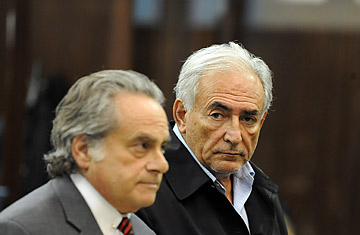

This post is in partnership with Worldcrunch, a new global news site that translates stories of note in foreign languages into English. The article below was originally published in Le Monde.
The Strauss-Kahn affair, which began in a Sofitel hotel room, shows that writing endless editorials or making sermons predicting the future does not get us any closer to the truth. When dealing with politics, French media usually call in a troop of editorial writers, rebaptized "commentators," whereas Anglo-Saxon newspapers, even if they have their own shortcomings, dedicate more space to investigative journalism that holds the power to make important revelations and share them with the public. A thirst for the facts has never harmed democracies.
French democracy needs a real shot of "common decency," a remedy coined by the British writer George Orwell. It is a code of simplicity and honesty, and should be followed by politicians, "intellectuals" and journalists. Common decency, in itself, obviously means respecting people, but above all, it is a refusal to create something from nothing. Instead, one must be obsessed by the submission to facts. This decency should forbid untoward comments, which are somehow deemed acceptable because of freedom of speech.
In 2006, Christophe Dubois and I wrote an investigative book titled Sexus Politicus about the aphrodisiac character of power and the various low blows of political life. It included a chapter called "the DSK affair," dealing with Dominique Strauss-Kahn's unconventional behavior. Not yet head of the International Monetary Fund back then, Strauss-Kahn is depicted taking unnecessary risks for a statesman in his position, and being surprisingly vulnerable. The scenes described in the book did not fall solely within the realm of seduction. We and our publisher Albin Michel faced intense pressures due to the nature of the information revealed in that chapter.
Since Sunday, I have refused to be interviewed because I don't want my comments to be mixed up with those made by specialists who have seen nothing, know nothing and read nothing. They have not even talked about seduction in politics (irrelevant to the current case) or cited the specific information published five years ago.
But once again, current affairs force us to question the use of journalists. What is the role of journalists? Some citizens think, not without reasons, that some journalists (not most of them, but some of the most influential ones) try to impose their ideas rather than seek to inform us. As a result, they form a largely pretentious class. They are like a political community that is free from difficulties of action but never deprived of speech. They resemble a media-friendly class, which neither acts (politicians' role), nor exposes the truth (journalists' role), but splits hairs instead.
Should we leave it to comedians to decide when and if some pieces of information should be revealed or not?
